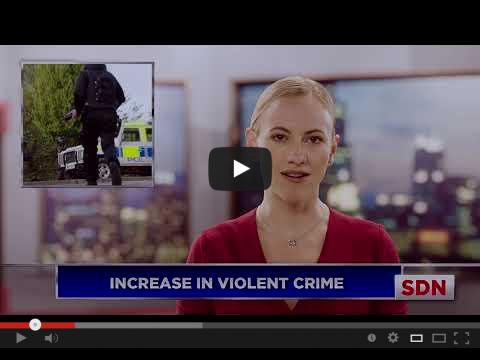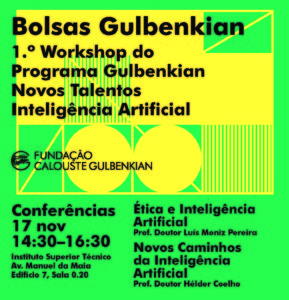APPIA informa que a cerimónia de jubilação de José Carlos Ferreira Maia Neves, Professor Catedrático do Departamento de Informática da Escola de Engenharia da Universidade do Minho e Investigador do Centro ALGORITMI, terá lugar no dia 9 de Fevereiro de 2018, às 16h00, no Anfiteatro B1 do Complexo Pedagógico 2, no Campus de Gualtar, Braga.
www.appia.pt/2018/01/22/jubilacao-do-professor-jose-carlos-ferreira-maia-neves/
Category: [rede.APPIA]
A [rede.APPIA] é a lista de distribuição de correio electrónico da APPIA, com o objectivo de divulgar notícias de interesse para a comunidade científica da Inteligência Artificial, disponível através do endereço rede [at] appia [ponto] pt.
[rede.APPIA] Special Session WCCI /IJCNN 2018 on Neurocomputation and Cognition (extended deadline)
http://www.ecomp.poli.br/~wcci
From: Bernardete Ribeiro <bribeiro@dei.uc.pt>
Date: Sat, Dec 23, 2017 at 10:01 AM
Subject: Special Session WCCI /IJCNN 2018 on Neurocomputation and Cognition
To: Docentes DEI <docentes-dei@dei.uc.pt>, CISUC-Investigadores <invs@cisuc.uc.pt>
A special session on “Cognition and NeuroComputation” has been organized by L. Manevitz, B. Ribeiro and A. Frid at this summers WCCI/IJCNN meeting in Rio de Janeiro. 2018 The submissions will undergo the standard reviewing process for this meeting; the main advantage in submitting to the special session will be the common interest of the participants. you should indicate when submitting the main research topic is “S20. Special Session on Neurocomputation and Cognition”. A link to the special session is below.
We encourage you to submit and/or to attend.
We will be interpreting ” NeuroComputation and Cognition” widely but around such topics such as:
The special session invites submissions in any of the following (and related) areas:
- Use of Neurocomputation and Machine Learning Tools to Identify Complex Physiological Features
- Neurocomputational Models for Cognition and Cognitive Tasks
- Finding Computational Biomarkers for cognitive tasks using Machine Learning tools
- Validation of cognitive models using machine learning methods
- Discovering Computational Biomarkers for Diseases (especially neurological diseases)
- Applications of Machine Learning and Neurocomputation to Cognitive Data
- Neurocomputational and Architectural Models of Creativity
- Innovative Neurocomputational Models appropriate for Cognition and Brain simulations
- Design of Feature Selection and other Machine Learning Tools for Classifying Cognitive and Brain Data
For a more complete description visit the link: http://www.ecomp.poli.br
You can also visit the home pages of the organizing laboratories: Neurocomputation Laboratory (neurocomputation.wordpress.co
of the LARN Laboratory of Prof. Ribeiro at Coimbra University.
——————————
Conference Links:
Main conference page: http://www.ecomp.poli.br
[rede.APPIA] ICCC2018: Call for Workshops and Tutorials
Dear all,
The content and format of workshops and tutorials are at the discretion of each event’s organizers. All workshop presenters will be encouraged to submit an accompanying poster to be presented during the main conference, and workshop organizers will have an opportunity to give a short “wrap-up” presentation to the conference as a whole. The ICCC2018 local team is also working hard to offer live streaming technology and support to workshop and tutorial organizers, so that all content and discussions can be recorded and shared (if the organizers so desire).
If a proposed workshop includes a call for paper submissions, we request that workshop organizers make the absolute latest date by which authors are informed of their acceptance be no later than May 12th, 2018, with the camera-ready deadline.
IMPORTANT DATES:
– Deadline for submitting proposals for workshops and tutorials: February 23th, 2018.
– Notification of acceptance for workshops and tutorials: March 8th, 2018.
– Deadline for submitting content to workshops: No later than April 30th, 2018.
– Deadline for notification of acceptance for workshop content: No later than May 12th, 2018.
WORKSHOPS:
Prospective workshop organizers must submit two things to iccc-2018-organising-committee@googlegroups.com by February 23th: a) a workshop proposal, and b) a ready-to-mail Call for Participation. The workshop proposal should be less than a page in length, and contain the following:
– A description of the workshop topic and why it is an important issue in computational creativity research.
– A description of the format of the workshop, and what you intend attendees to gain from it. We are particularly interested in workshops that are structured to promote discussion and attendee participation.
– The names and full contact details of the workshop organizing committee.
– An indication of whether this workshop should be considered for a half-day, full-day, or one-and-a-half-day slot.
The Call for Participation should be ready for the ICCC2018 team to mail out as-is. We want prospective attendees of your workshop to have as much time as possible to prepare their submissions, so please ensure the Call is as ready to go as you can make it: workshops will be in part judged on its completeness. This call can include requests for submissions, demonstrations, systems, performances, or any other requirement the organizers feel is appropriate for the workshop topic. Organizers of successful workshop proposals will be given a short period to update this email before it is distributed.
TUTORIALS:
Prospective tutorial organizers must submit a tutorial proposal to iccc-2018-organising-committee@googlegroups.com by February 23th. The proposal should be less than a page in length, and contain the following:
– A description of the tutorial topic (be it a system, a method, or something else) and what it contributes to computational creativity.
– A description of the format of the tutorial, and what you intend attendees to learn from it. We are particularly interested in tutorials that offer hands-on experience to participants.
– The names and full contact details of the tutorial organising committee (which could conceivably be a single person).
– An indication of whether this workshop should be considered for a half- or full-day slot.
[rede.APPIA] Special Session WCCI /IJCNN 2018 on Cognition and Neurocomputation
A special session on “Cognition and NeuroComputation” has been organized by L. Manevitz, B. Ribeiro and A. Frid at this summers WCCI/IJCNN meeting in Rio de Janeiro. 2018 The submissions will undergo the standard reviewing process for this meeting; the main advantage in submitting to the special session will be the common interest of the participants. you should indicate when submitting the main research topic is “S20. Special Session on Neurocomputation and Cognition”. A link to the special session is below.
We encourage you to submit and/or to attend.
We will be interpreting ” NeuroComputation and Cognition” widely but around such topics such as:
The special session invites submissions in any of the following (and related) areas:
- Use of Neurocomputation and Machine Learning Tools to Identify Complex Physiological Features
- Neurocomputational Models for Cognition and Cognitive Tasks
- Finding Computational Biomarkers for cognitive tasks using Machine Learning tools
- Validation of cognitive models using machine learning methods
- Discovering Computational Biomarkers for Diseases (especially neurological diseases)
- Applications of Machine Learning and Neurocomputation to Cognitive Data
- Neurocomputational and Architectural Models of Creativity
- Innovative Neurocomputational Models appropriate for Cognition and Brain simulations
- Design of Feature Selection and other Machine Learning Tools for Classifying Cognitive and Brain Data
For a more complete description visit the link: http://www.ecomp.poli.
You can also visit the home pages of the organizing laboratories: Neurocomputation Laboratory (neurocomputation.wordpress.co
of the LARN Laboratory of Prof. Ribeiro at Coimbra University.
——————————
Conference Links:
Main conference page: http://www.ecomp.poli.
[rede.APPIA] IV 2018 – 10 – 13 July – Palerno – Italy – Call for Papers, Videos and Participation
Call for Papers, Videos and Participation
Theme and scope is planned as series of symposia with details and further information is available at: iV2018 – Symposium & Theme
iV2018 – Information visualisation:
o Information Visualisation Theory & Practice
o Narrative
o Visualization and Storytelling
o Glyphs: Shapes, Icons, Text and Imagery in Visualization
o Information Visualization Evaluation
o Visual Analytics
o Social media analytics
o GeoVisual Analytics and Spatial-Temporal Analytics
o Knowledge Visualization and Visual Thinking
o Advances in Interactive and Visual Data Clustering
o Visualisation in Business Intelligence and Open Data
o Knowledge Domain Visualisation
o Open Source Intelligence and Web Mining & Web Visualization
o Co-operative Design Visualisation
o Human-Computer Interaction for Information Visualization
o Graph and Network Visualisation
o Digital Humanities Knowledge Visualization
Medivis2018 – BioMedical Visualization:
o BioMedical Visualization
vis2018 – Visualization:
o Visualization
o Visualization, Art, & Design
o Symposium of Digital Art and Gallery
o Augmented Reality Visualization and Art
o Computer Animation, Information Visualisation, and Digital Effects
o Computer Games and their applications (CGa)
o Multimedia and E-learning
o Digital Entertainment
GMAI2018 – Geometric Modelling and Imaging
BuiltViz2018 – Visualisation in Built and Rural Environments
Preconference course: Doctoral Research Workshop
——————————————————————————-
Important Dates :
1 March 2018 – Submission of papers & Submission of tutorials:
18 May 2018 – Submission of camera-ready & early registration closes
============================================
Conference Co-ordinator
GraphicsLink…
Tel: +44 1707 – 652 224
Email: iV_CGiV <iV_CGiV@graphicslink.co.uk>
URL: http://www.graphicslink.co.uk/IV2018/


[rede.APPIA] Fwd: AI Researchers Create Video to Call for Autonomous Weapons Ban at UN
—
Paulo Cortez (Habilitation, PhD)
Associate Professor, Dep. of Information Systems (DSI)
Researcher at ALGORITMI: http://algoritmi.uminho.pt/research-teams/ids/
University of Minho, Campus de Azurem, 4804-533 Guimaraes, Portugal
http://www3.dsi.uminho.pt/pcortez +351253510309 Fax:+351253510300
—————————————————————–
New Springer book: Modern Optimization with R
http://www.springer.com/mathematics/book/978-3-319-08262-2
—————————————————————–
Begin forwarded message:
From: Future of Life Institute <Ariel@futureoflife.org>Subject: AI Researchers Create Video to Call for Autonomous Weapons Ban at UNDate: 14 November 2017 at 05:37:55 GMTTo: Paulo <pcortez@dsi.uminho.pt>
Dear Paulo,
Thank you again for signing the 2015 open letter on autonomous weapons! This week, the United Nations Convention on Conventional Weapons began discussions to consider a treaty to ban autonomous weapons.
At a UN side event hosted by the Campaign to Stop Killer Robots, AI researcher Stuart Russell unveiled a short film, depicting a disturbing future in which lethal autonomous weapons have become cheap and ubiquitous. The video is fiction, but it represents a scenario that could become all too real if we don’t act soon.
We encourage you to watch the video below, share the video, and keep up with our efforts to ban lethal autonomous weapons at autonomousweapons.org.
Sincerely,
The FLI Team
Sent to: pcortez@dsi.uminho.pt
Unsubscribe
Future of Life Institute, PO Box 454, Winchester, MA 01890, United States
[rede.APPIA] Programa Gulbenkian Novos talentos em Inteligência Artificial: 1º workshop
Estimados colegas:
No âmbito do Programa Gulbenkian Novos talentos em Inteligência Artificial o 1º workshop realizar-se-á no próximo dia 17 de novembro de 2017, no Instituto Superior Técnico (Alameda), Pavilhão de Informática II (edifício 7), sala 0.20
Programa em anexo e no seguinte link:
www.appia.pt/2017/11/14/bolsas-gulbenkian-1o-workshop-do-programa-gulbenkian-novos-talentos-em-inteligencia-artificial/
Cumprimentos, Paulo Novais


